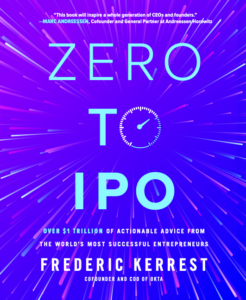Zero to IPO by Frederic Kerrest
The following is an excerpt from Frederic Kerrest’s newest book Zero to IPO: Over $1 Trillion of Actionable Advice from the World’s Most Successful Entrepreneurs. Fred cofounded Okta, a publicly traded software company now valued at over $40 billion. In Zero to IPO, he has collected a trove of nitty-gritty tips for each stage of a company’s growth and assembled them into a clear blueprint for how to build a business. Organized by topic in roughly the order that leaders will encounter them as they scale their businesses, this book is the ultimate guide to taking a company all the way from founding to IPO-and beyond. The following is an except from his book that Jordan Thibodeau has asked Fred to share with us.
Commit to “Unnatural Acts”
How to ensure the success of early customers or die trying
It’s not fully lunched until…
A best practice that Todd established at Okta that has worked well for us is that we don’t consider a new product to be fully launched until it’s operating successfully in at least five companies. By definition, with the first few customers, you’re going to discover all kinds of problems in the product itself and in the implementation strategy. Hopefully, these are not huge problems. Just small- to medium-sized kinks that are hard to uncover until your product is being used under real-world conditions.
Unnatural Acts
But you want those early customers to be happy despite the hiccups, right? These are your reference customers. So for those first five customers, you need to pull out all the stops and throw maximum manpower, time, and creativity to problem-solve any issue, so the customer experiences as few interruptions as possible. Those efforts are called “unnatural acts,” a term-ofart in the business world that refers to above-and-beyond efforts you make on behalf of the first users. (“Natural acts,” by contrast, are what you plan for, which don’t require extraordinary effort.)
In Okta’s early days, if a customer ran into a bug, we would put them on the phone directly with a programmer so it could be fixed as fast as possible. We obviously stopped doing that once our products reached maturity. With 10,000+ customers, it’s simply not scalable. (It’s also not necessary. A mature product is one where the bugs have already been found and fixed.) Still, we follow that protocol every time we launch a new product. Once five customers are fully up and running, and we’ve addressed any important issues, only then do we consider the product ready for a broader rollout.
The Last Stage of R&D
Another example of an “unnatural act” from our early days was when we’d have customer support calls go directly to my personal phone. At first, we didn’t have much of a support team. I also wanted to make sure I was staying on top of any issues our customers had. (Sadly, this left me with an understandably disgruntled wife when one of our early customers, who was based in Japan, made frequent calls during their workday, which rang in the middle of our night. Just one more reason your spouse needs to be on board when you decide to launch a startup.)
Unnatural acts will run you ragged and are unsustainable for the long haul. But they’re much bigger than simple customer service. They’re more like the last stage of your research and design process. You need to plan for these, so you have the people and the bandwidth on hand for when they’re needed.
If you like this excerpt, we highly recommend that you purchase Fred’s excellent book, Zero to IPO: Over $1 Trillion of Actionable Advice from the World’s Most Successful Entrepreneurs.
Check out the other parts of this series in our blog:




